末代皇帝 英文观后感
电影《末代皇帝》观后感
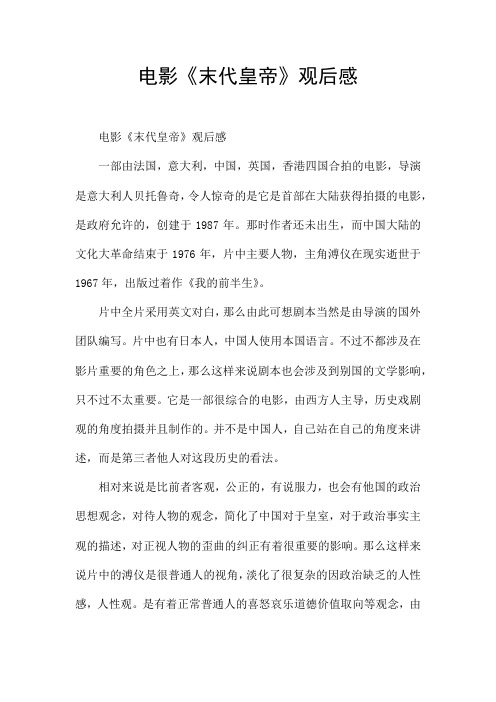
电影《末代皇帝》观后感电影《末代皇帝》观后感一部由法国,意大利,中国,英国,香港四国合拍的电影,导演是意大利人贝托鲁奇,令人惊奇的是它是首部在大陆获得拍摄的电影,是政府允许的,创建于1987年。
那时作者还未出生,而中国大陆的文化大革命结束于1976年,片中主要人物,主角溥仪在现实逝世于1967年,出版过着作《我的前半生》。
片中全片采用英文对白,那么由此可想剧本当然是由导演的国外团队编写。
片中也有日本人,中国人使用本国语言。
不过不都涉及在影片重要的角色之上,那么这样来说剧本也会涉及到别国的文学影响,只不过不太重要。
它是一部很综合的电影,由西方人主导,历史戏剧观的角度拍摄并且制作的。
并不是中国人,自己站在自己的角度来讲述,而是第三者他人对这段历史的看法。
相对来说是比前者客观,公正的,有说服力,也会有他国的政治思想观念,对待人物的观念,简化了中国对于皇室,对于政治事实主观的描述,对正视人物的歪曲的纠正有着很重要的影响。
那么这样来说片中的溥仪是很普通人的视角,淡化了很复杂的因政治缺乏的人性感,人性观。
是有着正常普通人的喜怒哀乐道德价值取向等观念,由一个复杂的历史政治人物,因他国的介入由此简化了实在一个普通人的人物命运,对于事实事物的选择,更能的凸显一个因上时代的变化,因家庭出身等等原因产生的个人的不幸,而对于共同历史来说又是万幸的,由于他的下台,结束了长达208年满清专制的统治,由于他的离开结束了长达5000年中国封建的社会制度,而由此走向了现代化。
令作者影响之深的是导演背景的音乐与镜头的运用十分的打动人,经典的片中台词“Open the door”一共出现了3次以上,实在让人联想起由当时慈禧太后统治的旧时代中国的“闭关锁国”政策,而极具讽刺的是溥仪的家人死于吸食鸦片,而鸦片正视当时英法等国,敲开旧时中国的很重要的敲门砖。
科技思想的落后终于促使我们“Open the door”了。
不在固步自封,自以为是,就像片中经典的段落溥仪趴在古老的故宫地砖上,听到陈旧的厚实的城墙外,喊杀打的声音,仿佛那时的旧中国被厚厚的城墙所隔离,与外部世界断开了联系了,外界发生的任何事物与我们好像没有任何的联系,英法等西方国家已经经过过工业革命,文艺复兴,不断的推翻重来推翻重来,而这边中国还在置办慈禧的六十大寿而大费国力……实在让人啼笑皆非。
末代皇帝观后感英语
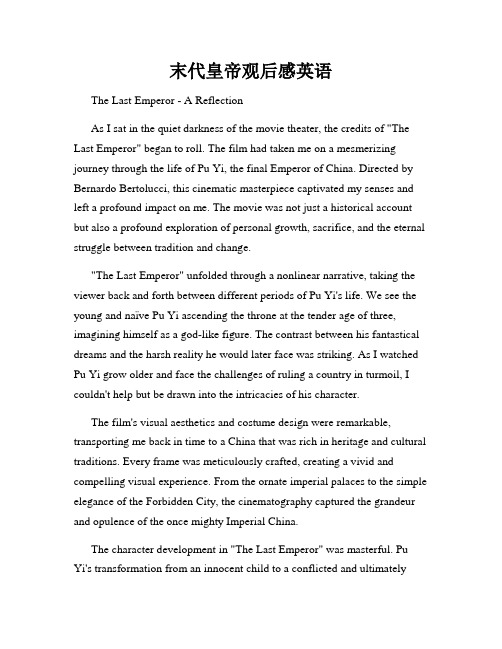
末代皇帝观后感英语The Last Emperor - A ReflectionAs I sat in the quiet darkness of the movie theater, the credits of "The Last Emperor" began to roll. The film had taken me on a mesmerizing journey through the life of Pu Yi, the final Emperor of China. Directed by Bernardo Bertolucci, this cinematic masterpiece captivated my senses and left a profound impact on me. The movie was not just a historical account but also a profound exploration of personal growth, sacrifice, and the eternal struggle between tradition and change."The Last Emperor" unfolded through a nonlinear narrative, taking the viewer back and forth between different periods of Pu Yi's life. We see the young and naïve Pu Yi ascending the throne at the tender age of three, imagining himself as a god-like figure. The contrast between his fantastical dreams and the harsh reality he would later face was striking. As I watched Pu Yi grow older and face the challenges of ruling a country in turmoil, I couldn't help but be drawn into the intricacies of his character.The film's visual aesthetics and costume design were remarkable, transporting me back in time to a China that was rich in heritage and cultural traditions. Every frame was meticulously crafted, creating a vivid and compelling visual experience. From the ornate imperial palaces to the simple elegance of the Forbidden City, the cinematography captured the grandeur and opulence of the once mighty Imperial China.The character development in "The Last Emperor" was masterful. PuYi's transformation from an innocent child to a conflicted and ultimatelybroken man fascinated me. As he is forced to abdicate the throne and adapt to a life outside the palace walls, Pu Yi becomes a mere pawn in the political games of the time. The film skillfully portrays his struggle to find his own identity and purpose in a world that has changed beyond recognition.Throughout the movie, Pu Yi's relationships with other characters served as a reflection of the shifting dynamics in China. From his close bond with his wet nurse, Wang, to his tumultuous friendship with his adoptive brother, Pu Ren, each relationship showcased the complexities of love, loyalty, and betrayal. These relationships reveal the conflicting forces of tradition and modernity that Pu Yi grapples with, mirroring the larger struggle faced by the nation.One of the most poignant scenes in the film occurs when a grown-up Pu Yi returns to the Forbidden City, now an ordinary museum. As he walks through the empty halls that were once filled with power and authority, a deep sense of loss and nostalgia overwhelms him. It becomes evident that the vastness of the Forbidden City mirrors the emptiness Pu Yi feels within himself. The scene symbolizes the demise of a fallen era, of traditions and values swept away by the winds of change."The Last Emperor" also sheds light on the impact of political ideologies on individuals. During Pu Yi's time as a puppet emperor under Japanese occupation, he is persuaded to embrace the ideals of Japanese militarism. It is in these moments that we witness the utmost vulnerability of Pu Yi as he succumbs to external pressures and loses touch with his inner self. This portrayal not only exemplifies the devastating consequences of blindadherence to political ideologies but also serves as a cautionary tale for all societies.As the credits finished rolling, I sat in silence, contemplating the profound story that had just unfolded before my eyes. "The Last Emperor" is not just a historical drama; it is a thought-provoking exploration of personal growth, the clash of tradition and modernity, and the consequences of political ideologies. It is a film that stays with you long after you leave the theater, lingering in your mind and heart.In conclusion, "The Last Emperor" is a visual masterpiece that delves into the complex life of Pu Yi, the last ruler of Imperial China. The film's masterful storytelling, stunning visuals, and exceptional performances create a deep emotional impact on the viewer. Through Pu Yi's journey, we are reminded of the importance of self-discovery, the fragility of tradition, and the power of individual choice in the face of political turmoil. "The Last Emperor" is a testament to the enduring power of cinema to enlighten, inspire, and provoke introspection.。
电影《Queen》观后感(英文)
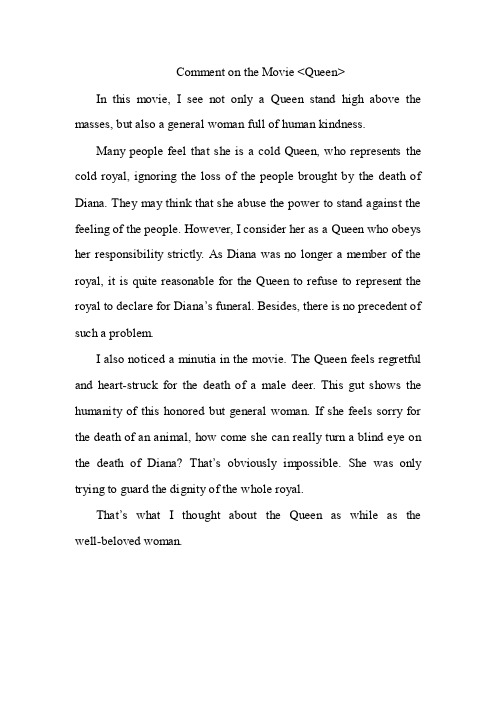
Comment on the Movie <Queen>In this movie, I see not only a Queen stand high above the masses, but also a general woman full of human kindness.Many people feel that she is a cold Queen, who represents the cold royal, ignoring the loss of the people brought by the death of Diana. They may think that she abuse the power to stand against the feeling of the people. However, I consider her as a Queen who obeys her responsibility strictly. As Diana was no longer a member of the royal, it is quite reasonable for the Queen to refuse to represent the royal to declare for Diana’s funeral. Besides, there is no precedent of such a problem.I also noticed a minutia in the movie. The Queen feels regretful and heart-struck for the death of a male deer. This gut shows the humanity of this honored but general woman. If she feels sorry for the death of an animal, how come she can really turn a blind eye on the death of Diana? That’s obviously impossible. She was only trying to guard the dignity of the whole royal.That’s what I thought about the Queen as while as the well-beloved woman.。
末代皇帝观后感英语300
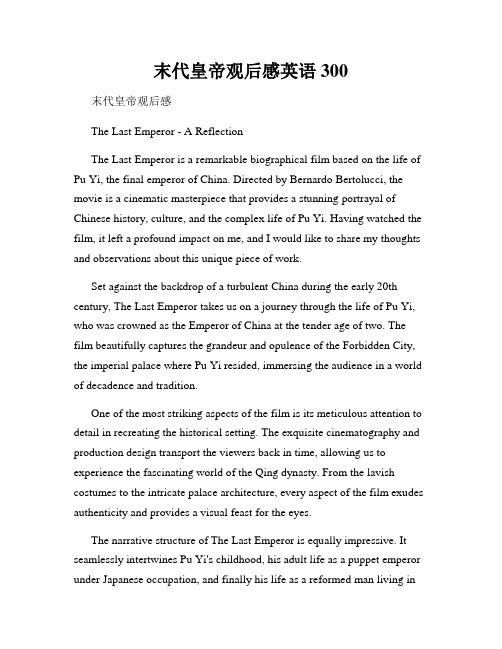
末代皇帝观后感英语300末代皇帝观后感The Last Emperor - A ReflectionThe Last Emperor is a remarkable biographical film based on the life of Pu Yi, the final emperor of China. Directed by Bernardo Bertolucci, the movie is a cinematic masterpiece that provides a stunning portrayal of Chinese history, culture, and the complex life of Pu Yi. Having watched the film, it left a profound impact on me, and I would like to share my thoughts and observations about this unique piece of work.Set against the backdrop of a turbulent China during the early 20th century, The Last Emperor takes us on a journey through the life of Pu Yi, who was crowned as the Emperor of China at the tender age of two. The film beautifully captures the grandeur and opulence of the Forbidden City, the imperial palace where Pu Yi resided, immersing the audience in a world of decadence and tradition.One of the most striking aspects of the film is its meticulous attention to detail in recreating the historical setting. The exquisite cinematography and production design transport the viewers back in time, allowing us to experience the fascinating world of the Qing dynasty. From the lavish costumes to the intricate palace architecture, every aspect of the film exudes authenticity and provides a visual feast for the eyes.The narrative structure of The Last Emperor is equally impressive. It seamlessly intertwines Pu Yi's childhood, his adult life as a puppet emperor under Japanese occupation, and finally his life as a reformed man living incommunist China. This multi-layered approach gives the audience a comprehensive understanding of Pu Yi's transformation from an innocent child to a flawed ruler, and eventually a humble citizen.In addition to its historical and cultural significance, The Last Emperor also explores profound themes such as identity, power, and personal growth. Pu Yi's journey mirrors the complexities and challenges faced by China as a nation during a period of immense change. From being revered as a living god to being stripped of his title and forced to adapt to a new way of life, Pu Yi's tumultuous life serves as a reflection of the struggles and transformations that China experienced during this era.The performances in The Last Emperor are commendable, particularly that of John Lone, who portrays Pu Yi with great depth and vulnerability. Lone captures the essence of Pu Yi's character, showcasing his arrogance, curiosity, and eventual humility with nuance and subtlety. The supporting cast, including Joan Chen as Pu Yi's wife and Peter O'Toole as his Scottish tutor, deliver performances that add richness and authenticity to the storytelling.While The Last Emperor is primarily an exploration of a specific time and place in history, it also raises universal questions about power and its consequences. Pu Yi's rise and fall from power serve as a cautionary tale, reminding us of the importance of humility, empathy, and embracing change. It is a poignant reminder that even the mightiest can be brought down, and that true strength lies in one's ability to adapt and learn from past mistakes.In conclusion, The Last Emperor is a cinematic masterpiece that offers a captivating glimpse into the life of Pu Yi and the historical contextsurrounding him. Through its stunning visuals, compelling narrative, and thought-provoking themes, the film provides a powerful experience that lingers in the mind long after the credits roll. It serves as a testament to the enduring legacy of the last emperor of China and the complex history of a nation in transition.。
英文电影观后感 last holiday
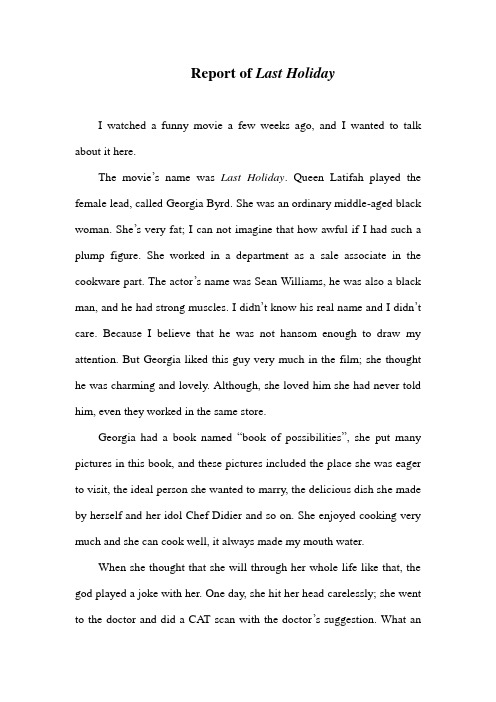
Report of Last HolidayI watched a funny movie a few weeks ago, and I wanted to talk about it here.The movie’s name was Last Holiday. Queen Latifah played the female lead, called Georgia Byrd. She was an ordinary middle-aged black woman. She’s very fat; I can not imagine that how awful if I had such a plump figure. She worked in a department as a sale associate in the cookware part. The actor’s name was Sean Williams, he was also a black man, and he had strong muscles. I did n’t know his real name and I didn’t care. Because I believe that he was not hansom enough to draw my attention. But Georgia liked this guy very much in the film; she thought he was charming and lovely. Although, she loved him she had never told him, even they worked in the same store.Georgia had a book named “book of possibilities”, she put many pictures in this book, and these pictures included the place she was eager to visit, the ideal person she wanted to marry, the delicious dish she made by herself and her idol Chef Didier and so on. She enjoyed cooking very much and she can cook well, it always made my mouth water.When she thought that she will through her whole life like that, the god played a joke with her. One day, she hit her head carelessly; she went to the doctor and did a CAT scan with the doctor’s suggestion. What anincredible thing! The result of this CAT scan was that she had Lampington’s disease which was very rare and terminal. The doctor told her: “in your condition, you’ve got about three weeks to live.” The news came as a thunderbolt. She cried, drank, because she just can’t believe it.When the doctor told her that the cost of a median cranial debunking surgery was around 340,000 dollars, she gave herself up and made a critical decision, she quit her job, liquidated the entire IRA, sold all of the bonds her mother left her, so, she got a large amount of money, but she just wanted to ran out of it.She chose to fly first class to the place she itches to visit---Karlovy Vary. Then she took the helicopter to her hotel. This hotel was the local most famous one, many famous people chose it. What’s more, her idol chef Didier worked in this hotel. She lived in a Presidential suite, took the expensive snowboarding lessons, ordered all the specials which was cooked by Chef Didier. Many famous people in this hotel were surprised by her and interested in her identity. But they also respected her, because Georgia was easygoing, friendly, humorous and never pride. She became the highlight in this hotel. The stuff in this hotel also thought she was the most amazing person who ever came to here; she just lives on the edge. When people knew that she was just a sales associate and only had three weeks to live, all the people were shocked and felt sorry about it. But then, the hotel received a telegram which sent by the hospital, the contentwas:“you have been misdiagnosed due to a faulty CAT-scan machine. You don’t have Lampington’s disease.”So, finally, Georgia got married with Sean the guy she loved, and realize her dream to set up a restaurant with her husband. What a happy ending it had.Maybe the ending was a little secular, but I still loved this movie. I saw a true existentialist, she just said what she wanted and did what she wanted, never mind whether people will laugh at her. I admired her attitude towards the life; even she can only live for three weeks. I didn’t know what will I do if I got this horrible news, but I can sure that I won’t do like Georgia. I have no courage. I was no brave enough. Maybe I just worried about my disease everyday and wait for died. My favorite scene in this film was when Georgia stood by the window of that hotel, she looked out of the window and she was intoxicated by the beauty of the outside, she said “what world was I living in.” She didn’t want die. There were lots of beautiful things in our world. People always found how wonderful the world was when they going to die, but it was too late. After watching that film I learnt many things. Perhaps, I couldn’t find the truth of the life, but I thought I can find the treasures in my life and cherish them. My parents, my friends, my lover and my dream which I hold. I also had the book of possibilities in my heart, and I wish I can turn it into the book of realities by work hard.And I believed that everyone can make their dream come true if they live every single day to the fullest.。
末代皇帝英文观后感

末代皇帝英文观后感《末代皇帝》(The Last Emperor)是一部由贝纳尔多·贝托鲁奇(Bernardo Bertolucci)执导的电影,讲述了中国末代皇帝——溥仪的一生。
这部电影以其独特的叙事方式和卓越的制作而成为一个经典作品。
在观看这部电影后,我深受感动和震撼,对中国历史和人性有了更深刻的理解。
电影从溥仪的童年开始,展现了他作为一个小孩子如何被选为中国最后一位皇帝,并在逼仄的王宫中度过了他的童年和少年时代。
影片通过细腻的细节和令人入迷的镜头表达了这个特殊时期的中国社会和政治氛围。
我被影片中生动的画面所吸引,如宫殿的华丽、礼仪的繁复以及帝国内部的权力斗争。
这些细节展示了中国封建时代独特的文化和制度,使我对这个时代有了更深入的了解。
影片的剧情发展贯穿了整个溥仪的一生,从他成为皇帝到被废黜,再到成为一名普通公民。
通过这一过程,观众得以见证溥仪从被人们追捧和顺从到被人们唾弃和忽视的变化。
我对这种权力的蜕变和人心的变幻深感惋惜。
溥仪是一个被历史洪流所冲击的无辜少年,他并没有选择成为皇帝,却要承担起整个帝国的压力和责任。
他的际遇让我对历史中的个人命运产生了深思。
影片中的演员表演出色,特别是小演员陈百强饰演的年轻溥仪。
他通过精湛的演技和情感表达让我对这个角色产生了共鸣。
他凭借稚嫩的面孔和纯真的眼神刻画出了一个无辜受害者的形象,我为他的表演所打动。
此外,其他演员也都以出色的表演赋予了影片更加真实和感人的氛围。
电影还通过溥仪与外国人的交往,呈现了中国历史上的重大事件和时代变革。
从溥仪的少年时期开始,他与外国人建立了亲密的关系,并被引导进入了现代化的世界。
这一过程不仅改变了他的世界观,也改变了中国的历史进程。
从这个角度来看,溥仪的一生是中国晚清时期和民国时期国家现代化转型的一个缩影。
这一点让我对中国的近代史产生了浓厚的兴趣,也让我思考了自己的身份认同和文化观念。
《末代皇帝》是一部以历史为背景的电影,但它更多地展示了人性的复杂和欲望的冲突。
末代皇帝观后感英文版
末代皇帝观后感英文版Title: Reflections on "The Last Emperor""The Last Emperor" is a cinematic masterpiece that offers a unique and captivating insight into the life of the final emperor of China, Puyi. Directed by Bernardo Bertolucci, this 1987 film delivers a visually stunning and emotionally resonant portrayal of a once powerful ruler reduced to a mere mortal.The film begins with Puyi's early childhood when he ascends to the throne at the tender age of three. The opulence and grandeur of the Forbidden City contrast sharply with the innocence and vulnerability of the young emperor. The elaborate costumes, ornate settings, and attention to detail authentically recreate the imperial atmosphere of the time, immersing the audience in the rich history of the Qing Dynasty.As the story unfolds, we witness Puyi's transformation from an ignorant and sheltered child to a politically manipulated puppet under the rule of the Japanese. The film beautifully captures the complexities of Puyi's character, portraying him as a lonely figure torn between his desire for freedom and his obligation to fulfill his duties as emperor.One of the most poignant aspects of "The Last Emperor" is its exploration of the theme of isolation. Even though surrounded by a multitude of servants and advisors, Puyi remains emotionally detached from the world around him. This inner conflict is particularly evident when he is forced to abdicate the throne and live as an ordinary citizen in the outsideworld. Puyi's struggles to adapt to a life devoid of privilege and to find a sense of self-identity are profoundly moving.The film's narrative structure is another aspect that contributes to its brilliance. The use of flashbacks and non-linear storytelling provides a layered and nuanced understanding of Puyi's life. By interweaving different periods of his existence, the viewer gains insight into the events that shaped the emperor's beliefs and actions. The juxtaposition of Puyi's childhood innocence with his later regret and remorse creates a multi-dimensional and sympathetic portrayal of his character.Moreover, "The Last Emperor" addresses larger historical and political issues that extend beyond Puyi's personal story. It sheds light on the tumultuous period of China's history, marked by the fall of dynastic rule, the rise of political ideologies, and foreign occupation. Through Puyi's experiences, the audience is exposed to the transformative power of political unrest and the fragility of power.The visual aesthetics of the film deserve special mention. Vittorio Storaro's meticulous cinematography captures the grandeur of the Forbidden City and the harsh realities of Puyi's later life with equal mastery. His use of color and light evokes a sense of time and place, further enhancing the overall atmospheric experience for viewers.In terms of performances, "The Last Emperor" showcases a truly exceptional cast. From John Lone's portrayal of the adult Puyi to Joan Chen's poignant performance as his loyal wife, the actors deliver nuanced and deeply emotional portrayals of their characters. Their collective abilityto communicate complex emotions without relying on extensive dialogue is a testament to their skills and the essence of their performances.In conclusion, "The Last Emperor" is a cinematic masterpiece that transcends the boundaries of time and culture. Its exploration of power, identity, and the human spirit resonates with audiences on a profound level. Through Bertolucci's masterful direction, the film immerses viewers in a world that is both alien and familiar, reminding us of the fragility of power and the universal yearning for freedom and meaning.。
电影末代皇帝英文作文
电影末代皇帝英文作文The Last Emperor is a biographical film directed by Bernardo Bertolucci, which tells the story of Pu Yi, the last Emperor of China. The movie is based on Pu Yi's autobiography and offers a glimpse into the tumultuous period of Chinese history during the early 20th century. In this essay, I will discuss the historical context, the portrayal of Pu Yi's life, and the film's overall impact.The Last Emperor is set against the backdrop of the declining Qing Dynasty and the subsequent political changes in China. It begins with Pu Yi's childhood as the Emperor of China, where he is isolated from the outside world and lives a life of luxury and privilege. However, as the film progresses, we witness the downfall of the Qing Dynasty, the rise of the Republic of China, and the eventual establishment of the People's Republic of China.The film effectively portrays the transformation of Pu Yi from an innocent child to a puppet emperor manipulatedby various political forces. As he grows older, Pu Yi becomes more aware of the changing political landscape and the diminishing power of the emperor. He is eventually forced to abdicate the throne and is imprisoned by the Japanese during their occupation of Manchuria.The Last Emperor also explores Pu Yi's personal struggles and his search for identity. After his release from prison, he is captured by the Soviet Union and held as a prisoner. During his time in captivity, Pu Yi undergoes a process of self-reflection and comes to terms with his role as the last emperor. He realizes the futility of his position and embraces a new life as an ordinary citizen.One of the most significant aspects of the film is its portrayal of Chinese history and culture. The Last Emperor provides a visually stunning representation of the Forbidden City and the imperial court. The costumes, set designs, and cinematography all contribute to creating an authentic and immersive experience for the audience.Furthermore, the film offers a critical commentary onthe impact of political ideologies on individuals. Pu Yi's life is shaped by the conflicting ideologies of monarchism, nationalism, and communism. He is used as a pawn by different political factions, highlighting thevulnerability of individuals in the face of largerpolitical forces.The Last Emperor received critical acclaim upon its release and won numerous awards, including nine Academy Awards. It is widely regarded as a masterpiece of filmmaking and a significant contribution to the biographical genre.In conclusion, The Last Emperor is a captivating film that provides a compelling portrayal of the life of Pu Yi, the last Emperor of China. It effectively captures the historical context, explores the personal struggles of its protagonist, and offers a critical commentary on the impact of political ideologies. Through its stunning visuals and powerful storytelling, the film leaves a lasting impact on its audience and serves as a testament to the complexities of Chinese history.。
帝国的覆灭观后感英语演讲
帝国的覆灭观后感英语演讲Reflections on the Fall of an Empire.The film "The Fall of the Empire" presents a profound and thought-provoking narrative about the rise and fall ofa once-mighty civilization. Through its intricate storyline, captivating characters, and breathtaking cinematography,the movie manages to capture the essence of what makes an empire thrive and ultimately collapse. In this post, I will delve into my thoughts and reflections on the film, discussing its themes, characters, and the messages it conveys.Firstly, the film's exploration of the themes of power, corruption, and hubris is truly remarkable. It highlights how easily absolute power can corrupt even the most nobleof intentions, and how hubris can blind leaders to the warnings and signs of impending doom. The emperor, once a visionary leader, transforms into a paranoid and tyrannical ruler, whose fixation on maintaining his grip on powerleads to the gradual decay of his empire. This narrative resonates deeply with historical parallels, reminding us of the importance of checking our own instincts for power and the dangers of ignoring the warnings of those we lead.The film's characters are also wonderfully crafted, each with their own unique traits and motivations. The emperor, while initially charming and charismatic, transforms into a cold and calculating ruler as the film progresses. His advisors and courtiers, each with their own agendas and ambitions, provide a vivid portrayal of the politics and intrigue that often underlie the facade of power. The film's protagonist, a loyal but disillusioned general, serves as a voice of reason and conscience, providing a contrast to the emperor's increasingly erratic behavior. His struggle between loyalty and duty, and his ultimate choice to act against the emperor, is a heartbreaking but necessary arc that drives the film's narrative forward.The cinematography of "The Fall of the Empire" is also breathtaking. The film's use of color, lighting, andcomposition creates a vivid and immersive world that draws the viewer in. The opulent palaces and bustling cities are a testament to the empire's former glory, while the decaying ruins and empty streets reflect its current state of decay. This visual contrast serves to emphasize thefilm's themes of decline and fall, providing a stark reminder of the impermanence of power and wealth.The film's message about the importance of wisdom, humility, and responsibility in leadership is also crucial. It suggests that leaders should be guided by reason and compassion, rather than blind ambition and paranoia. The emperor's failure to listen to his advisors, his refusal to accept criticism, and his obsession with maintaining absolute control ultimately lead to the collapse of his empire. This serves as a warning to leaders everywhere that power should be used responsibly and with humility, andthat ignoring the warnings of those we lead can have disastrous consequences.In conclusion, "The Fall of the Empire" is a thought-provoking and insightful film that explores thecomplexities of power, corruption, and leadership. Its themes and messages are as relevant today as they were when the film was made, serving as a valuable reminder of the importance of wisdom, humility, and responsibility in leadership. The film's characters, cinematography, and narrative all contribute to its overall impact, making it a must-watch for anyone interested in history, politics, or the human quest for power and meaning.。
heidi电影英文观后感
heidi电影英文观后感The film "Heidi" is a heartwarming tale that captures the essence of childhood innocence and the power of nature. Set against the breathtaking backdrop of the Swiss Alps, it tells the story of a young orphan girl who finds solace and joy in the company of her grandfather and the surrounding environment.Heidi's infectious spirit and her unwavering kindness to everyone she meets serve as a gentle reminder of the importance of empathy and compassion. The film beautifully illustrates how the bonds of friendship can transcend social status and age, as seen through her relationships with the gruff grandfather and the lonely Peter.One of the most poignant aspects of the movie is the transformation of Heidi's grandfather. Initially portrayed as a reclusive and bitter man, his heart softens as he becomes a loving guardian to Heidi, showcasing the redemptive power of love and acceptance.The cinematography in "Heidi" is nothing short of spectacular, with sweeping shots of the majestic mountains and lush valleys that not only provide a stunning visual experience but also symbolize the freedom and boundless potential that life offers.The film's narrative is a testament to the resilience ofthe human spirit, as it follows Heidi's journey through various trials and tribulations, always maintaining her cheerful disposition and optimism. It is a story that resonates with viewers of all ages, teaching us the value of simplicity and the strength that comes from being true to oneself.In its portrayal of Heidi's life in the city, the movie contrasts the bustling and structured urban life with the tranquility and freedom of the mountains, highlighting the stark differences in the way people live and the impact it has on their well-being.The soundtrack of "Heidi" complements the film's visual and emotional landscape, with its soothing melodies that evoke a sense of peace and longing for the simplicity of life in the mountains.Ultimately, "Heidi" is a timeless classic that speaks to the universal themes of love, family, and the beauty of nature. It is a film that leaves a lasting impression, inspiring viewers to cherish the simple joys in life and to embrace the transformative power of love and kindness.。
- 1、下载文档前请自行甄别文档内容的完整性,平台不提供额外的编辑、内容补充、找答案等附加服务。
- 2、"仅部分预览"的文档,不可在线预览部分如存在完整性等问题,可反馈申请退款(可完整预览的文档不适用该条件!)。
- 3、如文档侵犯您的权益,请联系客服反馈,我们会尽快为您处理(人工客服工作时间:9:00-18:30)。
"The Last Emperor" from the Perspective of Post-colonial Theory
Abstract: The movie "The Last Emperor" is a classic film that Italian director Bertolitch started shooting in China in 1984 and took three years to complete. After its release, it caused a huge sensation and won 9 Oscars. In the same year that the film was released, China began broadcasting the TV series "The Last Emperor" of the same name produced by its own artists. The drama aroused heated discussions in the literary and artistic circles, and in the same year won the "Flying Award", the highest achievement award in Chinese TV dramas.The study of two films of the same name from the perspective of Said’s post-colonial theory is to analyze the deep purpose behind the surface narration of the two films of the same name from the perspective of cultural politics:That is to say, on the one hand, according to the post-colonial logic of "Oriental image-imperialism-cultural resistance", analyze the "imperialist narrative logic" shown in the both film and television works.On the other hand, it analyzes the differences between eastern and western cultures by comparing both film and television works of the same name.
The content is divided into three parts. The first part is the introduction. Based on the two directors' different views on their own works, it pointed out the feasibility of conducting a comparative study between the both film and television works. The significance of the research is pointed out by summarizing the existing research literature. The second part is the body part, which is divided into three chapters. In the first chapter, through the analysis of the novel and negative Chinese images in “The Last Emperor”, it pointed out that the director fabricated the Chinese images with novel and prejudiced eyes. In the body part, the second chapter is on the basis of the first chapter, which pointed out that the fiction of the eastern image is in order to lay the foundation to establish the gain of imperialism and colonial interests , and through the comparison of the relationship development between the British Johnston, the Japanese Mr Amakasu and Pu Yi in the film to show the different ways of establishing two imperialist rule and the different means of obtaining benefits; Chapter three analyzes the differences between eastern and western cultures and the cultural resistance of TV drama to the film against imperialist narratives through different
writings of the same event in the movie "The Last Emperor". The third part is the conclusion. After summarizing the whole text, it pointed out that not only the film “the Last Emperor” shows the "Orientalism" which lacks understanding of Chinese culture, the TV series "The Last Emperor" also shows accusing the west of "Westernism". Although both film and TV drama failed to understand each other's cultural system, they showed their own nations’ unique cultural background in the process of telling stories. The film “The Last Emperor” reflects the western culture's tradition of paying attention to individuals, taking history as the background and telling the life course of "individuals". "The Last Emperor," on the other hand, reflected China's tradition of focusing on society and history, using "the individual" as a backdrop to reflect the direction of history in an attempt to reach a political height.。
